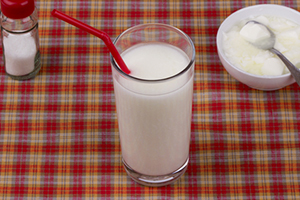 Your gut – where all kinds of things happen, which we won’t get into here.
Your gut – where all kinds of things happen, which we won’t get into here.
Actually, scratch that. Let’s talk about your gut. Because your gut is home to “teeny tiny” creatures that can – believe it or not – help you out when it comes to fighting type 2 diabetes and managing obesity.
But you’ve got to help these microscopic creatures out if you’d like to send type 2 diabetes running.
Turkish researchers found out that those who suffer from type 2 diabetes and obesity have significant changes in their intestinal flora compared to the microbiota of healthy individuals.
The healthy human digestive system hosts 10 to 100 trillions of bacteria and microorganisms.
It is estimated that each human has at least 160 different kinds of gut microorganisms.
The team of researchers wanted to identify the connection between the gut flora and type 2 diabetes and obesity.
In the study, researchers included 27 severely obese individuals (BMI more than 35 kg/m2), 26 adults with newly diagnosed type 2 diabetes and 28 healthy control subjects.
None of the study participants took antibiotics for at least 3 months prior to the study and none were taking any medications. The age of study participants ranged between 18 and 65.
The stool samples of all study participants were collected to determine the kinds and levels of gut microbiota.
Fecal analysis of participants revealed that levels of the most common gut bacteria were considerably lower in type 2 diabetes and obesity groups when compared to the levels of healthy control group.
In addition, researchers discovered that Body Mass Index ( BMI) and hemoglobin A1 c, a measure of blood glucose control over the last 3 months, significantly influenced the levels of the most common intestinal bacteria called Firmicutes.
“Waist circumference,” a measure for abdominal fat, affected the levels of Bifidobacteria – another very common and beneficial type of bacteria.
Researchers believe that intestinal gut flora alters the low-grade inflammation, which could affect sugar metabolism and body weight.
The levels of intestinal flora soon could be used as substantial markers to determine the risks of metabolic diseases, such as obesity and type 2 diabetes and hopefully as an effective way to treat them.
More and more mounting evidence shows that healthy intestinal flora is crucial to maintain good health. It helps fight dangerous bacteria, controls yeast overgrowth and supports healthy immune systems.
There are many ways to ensure the health of your gut. For example, plain yogurt and kefir are loaded with beneficial bacteria.
You could also take a probiotic supplement found in most (if not all) health food stores and pharmacies all over the world.
However, these “little guys” might not be able to heal your type 2 diabetes or help with weight loss…
Fun fact: losing weight is easy with this simple, straightforward approach. Check it out here…

 Overcoming IBD
Overcoming IBD Multiple Sclerosis
Multiple Sclerosis Banishing Bronchitis
Banishing Bronchitis Gum Disease Gone
Gum Disease Gone Overcoming Onychomycosis
Overcoming Onychomycosis Neuropathy No More
Neuropathy No More The Prostate Protocol
The Prostate Protocol Brain Booster
Brain Booster
 Ironbound
Ironbound
 Solution for Shingles
Solution for Shingles
 The Bone Density Solution
The Bone Density Solution
 The Ultimate Healing Protocol
The Ultimate Healing Protocol
 The Parkinson's Protocol
The Parkinson's Protocol
 The Chronic Kidney Disease Solution
The Chronic Kidney Disease Solution
 Overthrowing Anxiety
Overthrowing Anxiety The Fatty Liver Solution
The Fatty Liver Solution The Hypothyroidism Solution
The Hypothyroidism Solution
 The End of Gout
The End of Gout The Blood Pressure Program
The Blood Pressure Program
 The Oxigized Cholesterol Strategy
The Oxigized Cholesterol Strategy
 Stop Snoring And Sleep Apnea Program
Stop Snoring And Sleep Apnea Program
 The Arthritis Strategy
The Arthritis Strategy The Vertigo & Dizziness Program
The Vertigo & Dizziness Program The 3-Step Diabetes Strategy
The 3-Step Diabetes Strategy Hemorrhoids Healing Protocol
Hemorrhoids Healing Protocol The Erectile Dysfunction Master
The Erectile Dysfunction Master Weight Loss Breeze
Weight Loss Breeze The IBS Program
The IBS Program The Insomnia Program
The Insomnia Program The Migraine and Headache Program
The Migraine and Headache Program The Neck Pain Solution
The Neck Pain Solution The Menopause Solution
The Menopause Solution The Ejaculation Master
The Ejaculation Master The TMJ Solution
The TMJ Solution The Acid Reflux Solution
The Acid Reflux Solution The Fibromyalgia Solution
The Fibromyalgia Solution The Psoriasis Strategy
The Psoriasis Strategy
I think that macrobiotic research is going to reveal some of the most interesting health discoveries of the next few decades. I read somewhere that 90% of all DNA in our body was actually not ours but some tiny micros (bacterias). They are just so small we don’t realize it.
This shows just how important it is to take probiotics. I don’t like milk products (some of the most common source of probiotics) but when I’m feeling a little sluggish, I load up on pickles and sauerkraut.
The research in the field will certainly bring good results which we are reading of late
Could you please include the citation for reserarch papers when you cite them on this site? As a medical services expert, I am interested in reading the original papers. Thank you.
how to get rid of diabetis 2 what r the best fruits and vegetables to control high blood sugar